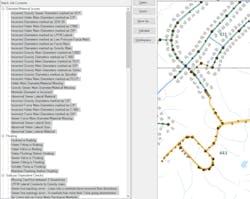Increasing Data Quality to Leverage Spatial Analytics
The Prince William County Service Authority supplies clean water and superior service to a large and ever-growing metropolitan population. The Service Authority owns and maintains more than 2,300 miles of pipeline distributing up to 56 million gallons of water a day and treating 43 million gallons of wastewater a day for approximately 350,000 people.
Challenge
Once assets were added to the geographic information system (GIS) asset registry during the utility design phase, spatial and attribute information was manually edited at least four more times throughout the asset's life cycle. This created opportunities for variability in editing and mistakes. As an asset was installed and surveyed, more complete location and attribute data was updated.
Previously, only one person performed QA/QC manually at every life cycle phase. The QA/QC process resulted in overallocation of tasks to one-person, lengthy lag times between edits and corrections, and slow feedback for improving and sharing editing standards.
Solution
The Service Authority implemented ArcGIS Data Reviewer batch jobs and Cityworks permits, licensing, and land workflows to create a new streamlined, standardized, and fully deployed QA/QC business process. The workflow allows QA/QC to be a shared responsibility (semiannually rotating editor and QA/QC partner pairs) across the GIS production team. Every time a neighborhood-sized project of GIS assets is edited, two batch jobs are run, consisting of a set of completeness and connectivity checks for the editor and a set of valency and validation checks for the QA/QC partner. All the batch jobs include approximately 40 checks tailored to editing standards. The production team meets regularly to discuss variability in the editing process, identify new checks, and refine existing checks. QA/QC partner rotation further standardizes production editing by advancing discussions on editing standards across the team. In addition, systemwide batch jobs identify large-scale cleanup projects to enhance data quality and improve the water and sewer hydraulic models and asset management program.
Result
The reduction of manual reviewing has reduced total QC time from an hour and a half to 30 minutes. It has also reduced the lag time between editing and QC from roughly two months to two weeks by alleviating the bottleneck created by one person performing all the work. The new QA/QC process using Data Reviewer has improved the reliability of data through customized validation rules that automate the verification of spatial data, attributes, configuration, and connectivity. The automated QC process has increased data quality by reducing variability in editing and has allowed the Service Authority to define increasingly formal data editing standards and better quantify quality metrics. By helping to identify and address errors more quickly, this new QC process has increased the organization's ability to confidently leverage spatial analytics and decision-making frameworks to support the successful execution of the Service Authority's strategic objectives.
"The Service Authority's enterprise-wide information management and analytics initiatives are fundamental to the successful operation of the utility's vast and complex collection, distribution, and treatment systems," said Jeanetta Williams, GISP, PMP, MPA — Director of Enterprise Asset Management.

